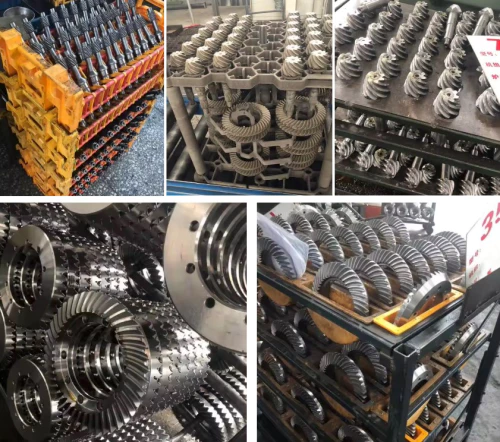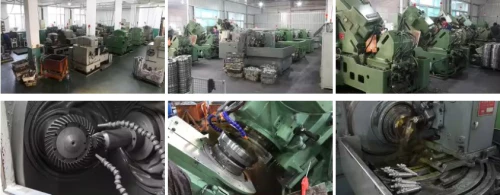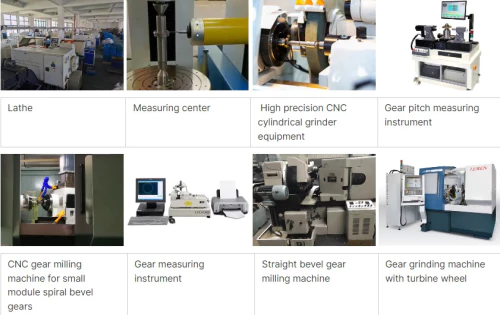Forging Bevel Gear Surface Coating Application Techniques
Forging bevel gears are a type of bevel gears that are manufactured through the forging process. Forging involves shaping metal through the application of localized compressive forces, typically using a die or hammer. In the case of bevel gears, the forging process is used to form the gear teeth and create the desired gear geometry.
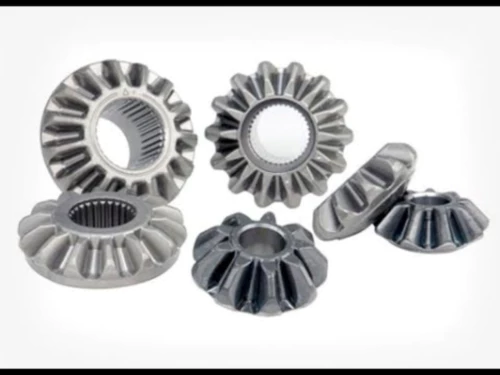
Advantages of Forging Bevel Gears
1. High Strength
Forging bevel gears exhibit high strength due to the compressive forces applied during the forging process. This results in gears that can withstand heavy loads and operate under demanding conditions.
2. Improved Fatigue Resistance
The forging process enhances the fatigue resistance of bevel gears, making them more durable and less prone to failure caused by repeated cyclic loading.
3. Precise Gear Tooth Geometry
Forging allows for the creation of bevel gears with precise tooth geometry, ensuring smooth and efficient operation, as well as optimal power transmission.
4. Cost-Effectiveness
Forging bevel gears offer cost-effectiveness in terms of production and maintenance. The high strength and durability of forged gears result in reduced maintenance costs and longer service life.
5. Versatility in Material Selection
Forging can be applied to a wide range of materials, allowing for the selection of materials that best suit the application requirements of bevel gears.
6. Enhanced Structural Integrity
The forging process enhances the structural integrity of bevel gears, ensuring their ability to withstand heavy loads and harsh operating conditions.
7. Tailored Mechanical Properties
Forging allows for the customization of bevel gears with specific mechanical properties, such as hardness, toughness, and wear resistance, to meet specific application needs.
8. Reduced Lead Time
The forging process provides shorter lead times compared to other manufacturing methods, ensuring faster production and delivery of bevel gears.
9. Environmental Sustainability
Forging is a sustainable manufacturing process that minimizes material waste and energy consumption, making it an environmentally friendly choice for bevel gear production.
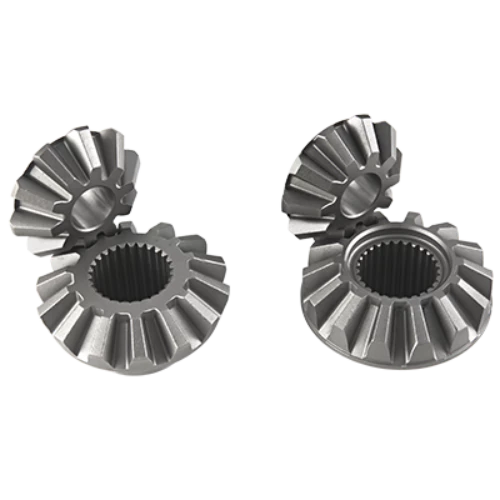
Working Principles of Forging Bevel Gears
Forging bevel gears operate based on the fundamental principles of gear mechanisms. They consist of two intersecting shafts, each with a conically shaped gear (bevel gear) mounted on it. The teeth of the bevel gears are designed to have a specific tooth profile, such as straight, spiral, or hypoid, depending on the application requirements.
When the input shaft rotates, the engagement of the teeth of the bevel gears causes a transfer of rotational motion and torque to the output shaft. The contact between the mating teeth ensures power transmission while maintaining proper alignment and smooth operation.
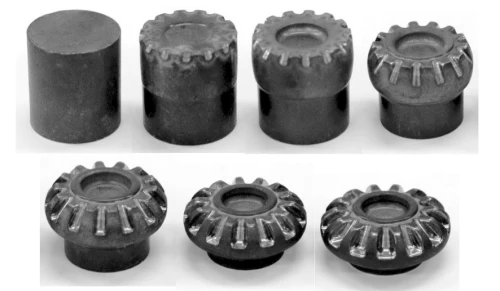
Applications of Forging Bevel Gears
1. Automotive Industry
Forging bevel gears are widely used in the automotive industry for applications such as power transmission in engines, transmissions, and differential systems.
2. Industrial Machinery
Forging bevel gears find application in various industrial machinery, including heavy machinery, mining equipment, and construction machinery, for torque transmission and power distribution.
3. Aerospace and Defense
The aerospace and defense sectors utilize forging bevel gears in aircraft engines, helicopter transmissions, missile systems, and other critical applications that require high reliability and performance.
4. Renewable Energy
Forging bevel gears play a crucial role in renewable energy systems, such as wind turbines and solar trackers, where they enable efficient power generation and conversion.
5. Marine and Shipbuilding
In the marine and shipbuilding industry, forging bevel gears are used in propulsion systems, steering mechanisms, and other essential components that ensure the smooth operation of vessels.
6. Agricultural Machinery
Agricultural machinery, including tractors and harvesting equipment, relies on forging bevel gears for power transmission and efficient functioning in demanding farming environments.
7. Power Generation
Forging bevel gears are vital in power generation systems, such as turbines and generators, where they facilitate the conversion of mechanical energy into electrical energy.
8. Robotics and Automation
In robotics and automation, forging bevel gears are used in robotic arms, automated machinery, and precision motion control systems, enabling precise and reliable movement.
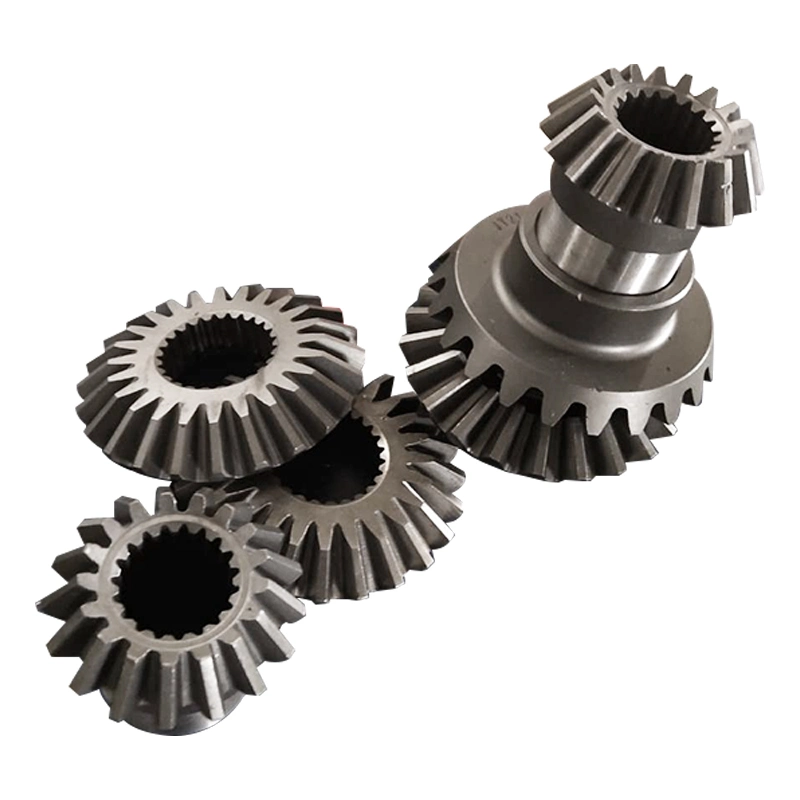
Installation and Maintenance of Forging Bevel Gears
Installation:
- Proper Alignment
- Lubrication
- Mounting Bolts
- Inspection
Maintenance:
- Lubrication
- Cleaning
- Inspection
- Replacements
- Gearbox Maintenance
- Load Monitoring
- Training and Expertise
- Record-Keeping
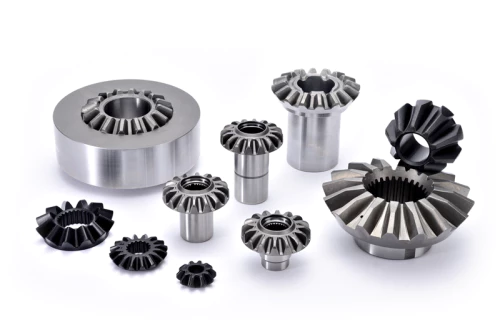
How to Select Suitable Forging Bevel Gears
- Application Requirements
- Design and Specifications
- Material Selection
- Quality and Reliability
- Load-Carrying Capacity
- Efficiency and Performance
- Customization and Adaptability
- Cost Considerations
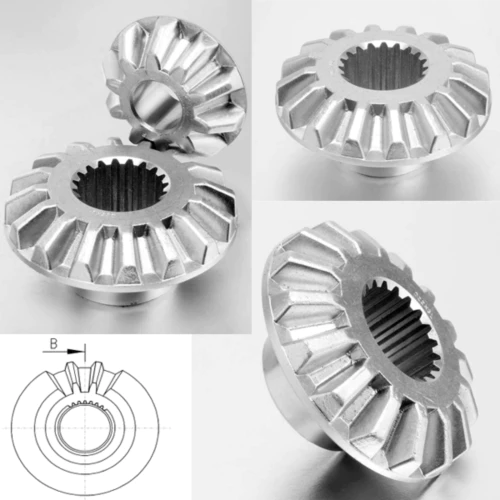
Introduction to Shaoxing Chaoli Company
Shaoxing Chaoli is a professional manufacturer of gears in China. Our products are exported to different countries such as Spain, the Netherlands, the United States, South Korea, Turkey, and Russia. At the same time, we sincerely hope to help customers develop new products and solve technical and quality problems. We are willing to meet the needs of users with high-quality products, fair prices, and perfect services.
In short, we adhere to the principles of quality first, timely delivery, and credit first, treat every business partner sincerely, and wholeheartedly welcome friends from the business community to cooperate with us to develop together and create brilliance.
Besides forging bevel gears, Shaoxing Chaoli also offers other gear products such as Worm Gears, Spiral Bevel Gears, Helical Gears, Spur Gears, Plastic Gears, and Metric Gear Racks. Customers are welcome to inquire about customized products.
Shaoxing Chaoli is a professional manufacturer of gears in China. Its products are mainly sold to hundreds of fixed suppliers such as domestic steel rolling mills, shipyards, precision machine tool factories, automation machinery factories, and various distribution companies, and exported to Western Europe, the Middle East, and Southeast Asia and other countries and regions. The developing Shaoxing Chaoli currently has hundreds of employees, including many engineers, with fixed assets of 20 million yuan and an annual output value of 50 million yuan.
The company has a complete set of strict quality management systems, equipped with a series of precision measuring instruments such as optical projectors and 16 full-process production monitoring systems. Shaoxing Chaoli has considerable competitiveness in the same industry.
